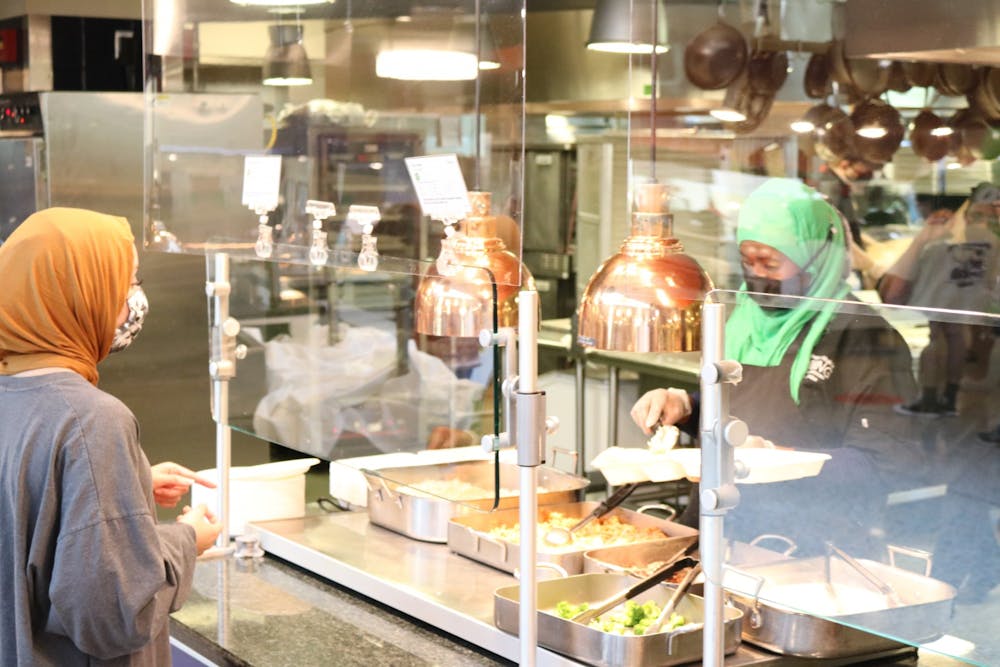Lea en español
The University has a responsibility to educate its students both inside and outside of the classroom. The environment around Grounds is laced with implicit suggestions that change the way students see the world. That being said, my observation of the dining hall staff is that they are overwhelmingly Black. In contrast, I do not have a single Black professor. Meanwhile, I haven’t seen more than a handful of white dining staff — but I do have many white professors. The profuse presence of Black staff in low-paying positions combined with a lack of Black professors is alarming. Although the University claims to value racial diversity, its hiring practices don’t appear to reflect this value. Students are left to grapple with the conflicting concepts of attested declarations that Blackness is valued at the University and an environment that suggests the opposite.
Before I continue, it is imperative to note that considering national trends that illustrate workplaces often refuse to hire Black people, I am not advocating that white workers replace Black workers. There is extensive evidence of the pervasive discrimination that prevents Black workers from obtaining employment as well as research that such discrimination continues to hinder access to upper level positions. For example, a Harvard Business Study compared resumes of minorities that indirectly disclosed their race compared to those that did not, to conclude that the “whitened” resumes received significantly more job call-backs. Black people are unfairly disadvantaged in the job search process for low and high paying jobs. So, while I commend the University in meeting the excessively low expectation of hiring Black people at all, I still extend concern over the abrupt discrepancy between Black people in low-paying positions compared to high-paying positions.
The abundance of low-paying Black positions exists in concurrence with a lack of Black-held professor positions. I do not have any Black professors — five out of my six professors this semester are white — or at least white-passing — as I did not ask for their racial identity. In reviewing the University’s Diversity Dashboard, my observations reflect the University’s data. In 2019, the total faculty, defined as “Teaching and Research Faculty” was made up of 108 Black members contrasted to a resounding 2,141 white individuals. In comparison, the total staff, defined as “University Staff, Classified Staff and Administrative and Professional Faculty,” was made up of 812 Black faculty members compared to 5,361 white faculty members. This comes to a 3.67 percent Black makeup of faculty and a 11.19 percent Black makeup of the entire staff. Black employees of the University are over seven times more likely to hold a staff position than a faculty position.
This data is especially concerning when considering the history of Black servitude within the University. Enslaved Black people were largely responsible for constructing Mr. Jefferson’s University — an imagined utopia of knowledge that ignored those bearing the brunt of the labor. I worry that the University is perpetuating a racist tendency that works to imply a subservient role of Black people. Black students’ confidence can suffer as they grow accustomed to seeing Black people in positions of servitude, while white students are falsely reaffirmed that they belong in their dominant social position. Despite the lack of explicit racism in this case, race-based implicit biases are just as dangerous.
The most worrisome outcome is the harm done to Black students. The University is predominantly white. Comparatively, Black students make up less than 10 percent of the University’s population. Black students on Grounds are a clearly underrepresented group — and this disparity in Black employment levels is sure to further alienate Black students.
The University has a moral responsibility to provide assistance to marginalized groups. While the existing presence of minority support programs are a welcomed inclusion, anti-racist work at the University cannot be seen as an isolated task. Effective anti-racism mandates the restructuring of the entire community on Grounds. Appropriate representation of Black employees in upper-level positions is one of many steps the University should be taking on their path towards an anti-racist environment. The University cannot limit itself to verbally championing for Black rights — it must take action.
Jessica Moore is a Viewpoint Writer for The Cavalier Daily. She can be reached at opinion@cavalierdaily.com.
The opinions expressed in this column are not necessarily those of The Cavalier Daily. Columns represent the views of the authors alone.
CORRECTION: A previous version of this article stated that "Black employees of the University are over three times more likely to hold a staff position than a faculty position." The article has been changed to reflect the correct number.







